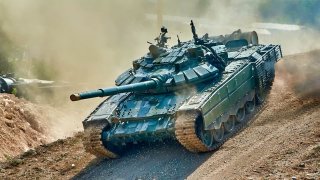Pushing Ukraine Back to the Soviet Union?
Harsh criticism and pushy moves by the European Union could send Kiev running back into Moscow's arms.
 Ukraine scored a historic upset in their first Euro 2012 soccer match yesterday, creating a rare celebratory and unifying atmosphere in the country. There had been little good news out of the Ukraine leading up to its cohosting—with Poland—of the Continent’s major soccer championship. Despite achieving independence two decades ago, Ukraine’s political development remains stunted. Ironically, European governments risk pushing Kiev away while attempting to promote democracy there with moves such as Berlin’s threat to block a new political and trade agreement between Ukraine and the European Union.
Ukraine scored a historic upset in their first Euro 2012 soccer match yesterday, creating a rare celebratory and unifying atmosphere in the country. There had been little good news out of the Ukraine leading up to its cohosting—with Poland—of the Continent’s major soccer championship. Despite achieving independence two decades ago, Ukraine’s political development remains stunted. Ironically, European governments risk pushing Kiev away while attempting to promote democracy there with moves such as Berlin’s threat to block a new political and trade agreement between Ukraine and the European Union.
There’s not a lot to choose from among Ukraine’s leading politicians. However, President Viktor Yanukovich appears to be misusing his power to punish rival Yulia Tymoshenko for political revenge.
In response, German chancellor Angela Merkel said that her nation would boycott the 2012 European Championships. Last month, German foreign minister Guido Westerwelle also threatened to kill Kiev’s Association Agreement and the Common Economic Space Treaty with the EU. Ukraine is a member of the Eastern Partnership initiative, created three years ago by Brussels.
Ukraine is not the only troubled member of the EP: Armenia, Azerbaijan, Belarus, Georgia and Moldova all have serious human-rights issues. However, Nicu Popescu of the European Council on Foreign Relations explained that while Ukraine is not the worst offender among the group, it “is the biggest source of disappointment and bad news.” As a result, warned Jana Kobzova, also at the council, “More and more EU states are asking why should we want the Ukraine closer to the EU when its political system is increasingly incompatible with the values the EU preaches?”
It’s a fair question, but the alternative is Kiev slipping closer to orbit around Russia. Yanukovich originally was viewed as Moscow’s candidate, since he represented Russophone speakers. However, in office he put his nation first. He has refused to join Russia’s Customs Union (which also includes Belarus and Kazakhstan) and turn over control of Ukraine’s natural gas to Moscow. But because of resistance in Brussels, Yanukovich last month declared a “strategic pause” in Ukraine’s relations with the EU. In fact, Foreign Minister Konstantin Grishenko said his nation would no longer seek full EU membership.
Germany and the other EU members should moderate their ambitions. None of the Eastern Partnership members were on the fast track to EU membership. The systems were too different, and the geographic distances were too great. Even before Kiev disappointed its European friends, people were talking of a twenty-year accession process. And enlargement fatigue had not yet afflicted Brussels, with disappointment over the performance of Bulgaria and Romania, resistance to Turkey’s membership and reluctance to quickly include the rest of the Balkans.
Instead of viewing Ukraine as a candidate member to be transformed, the Europeans should treat Ukraine as an errant friend to be reformed. Closer ties should be developed, allowing more criticism to be delivered with greater effect. The association agreement between the EU and Kiev obviously is important economically to Ukraine. It also may be the best vehicle to help pull Kiev back to a more democratic course.
Image: Pavol Frešo

